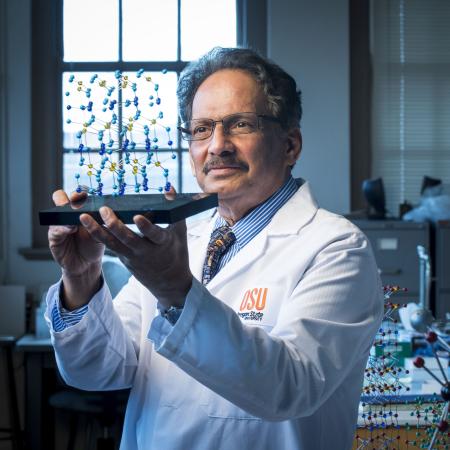College of Science research expenditures for FY22 totaled $14.3M. Federally funded expenditures from agencies and national laboratories for the year were $8.5M.
Moving science forward
Many science faculty received substantial research grants last year. College of Science research awards led to advancements in areas ranging from probing electrochemical techniques to investigate the social behavior of microbes, to tracking viral infections in endangered corals or exploring materials with the potential for improved efficiency of CO2 capture from ambient air. Below are just a few notable awards:
Biologist Felipe Barreto received $598K from the National Science Foundation for a project entitled "Evolutionary genetics of an alternative molecular mechanism of hypoxia response in metazoans."
Microbiologist Stephen Giovannoni received $260K from the Bermuda Institute of Ocean Sciences Inc for a project entitled "BIOS-SCOPE II - A Collaborative Program for the Study of Microbial Oceanography in the North Atlantic Subtropical Gyre."
Biologist Kirsten Grorud-Colvert received $364K from the National Philanthropic Trust for a project entitled "Achieving effective ocean protection: Using the MPA guide to advance global commitments."
Computational biochemist David Hendrix led a multi-college collaborative team to receive $638K from USDA-NIFA for a project entitled "The essence of Cannabaceae: Comparative genomics and metabolomics to unravel the complexities of aroma and flavor."
Chemist Dipankar Koley received $423K from the National Institutes of Health–Dental & Craniofacial Research for a project entitled "Manipulation of Bacterial Metabolism: A New Approach to Develop Smart Dental Composites."
Chemist Marilyn Mackiewicz's $400K NSF CAREER grant over five years will support her work to train the next generation of scientists to be successful as she continues investigating the use of biomaterial to address age-related macular degeneration.
Biochemist Ryan Mehl has received multiple federal grants to carry forward his research on genetic code expansion:
-$1.21M from NSF for a project entitled "Ideal Eukaryotic Tetrazine Ligations For Imaging Protein Dynamics in Live Cells."
-$1.145M by NIH for his project entitled "Defining Roles of NitroTyrosine in Disease Via Genetic Code Expansion."
-$1.65M together with biochemist Rick Cooley from Amgen for projects on the engineering of antibodies as therapeutics using genetic code expansion.
Chemists May Nyman and Tim Zuehlsdorff's proposal, entitled "Passive and enhanced capture and conversion of CO2 by d/f0 molecules and materials," was one of the nine proposals selected by the U.S. Department of Energy for a $6.6M grant to explore new materials and chemical processes with the potential for improved efficiency of CO2 capture from ambient air.
Chemist May Nyman also received $954K from the U.S. Department of Energy for a project entitled "Passive and enhanced capture and conversion of CO2 by d/f0 molecules and materials."
Physicist Heidi Schellman was awarded $3M over three years from the Department of Energy for her project "Essential Computing and Software Development for the DUNE experiment." The award is shared with collaborators among four universities.
Microbiologist Thomas Sharpton received $396K from the National Institutes of Health for a project entitled "Impacts of Bezo[a]pyrene on Microbiome Development across Lifespan and Generations and the Behavioral Consequences."
Microbiologist Martin Schuster received $711K from NSF for a project entitled "Self versus group-sensing in bacteria."
Mathematician Holly Swisher received $212K from NSF for a project entitled "Modular forms, combinatorial generating functions, and hypergeometric functions."
Microbiologist Rebecca Vega Thurber received $365K from the State of Florida for a project entitled "Tracking viral infection status in Lower Keys and Dry Tortuga Corals using TEM and Meta-transcriptomics."
Biologist Virginia Weis received $598K from NSF for a project entitled "Collaborative Research: Cell biology of cnidarian-dinoflagellate symbiosis: Signaling, regulation and host response pathways.”
Looking ahead: Positive momentum for FY21
The College is experiencing momentum with significant awards into the new fiscal year. Below are just a few incoming awards received since July 1, 2022:
Chemist David Ji is the principle investigator on a $3M grant from the Department of Energy entitled, “Understanding the Interfaces for High-Energy Batteries Using Anions as Charge Carriers,” that includes collaborators from Howard University, the University of Maryland and Vanderbilt University. OSU’s portion of the award will be $840K.
David Ji also received a four-year $400K grant from the National Science Foundation for a project entitled “CAS-Climate: Collaborative Research: Understanding How Electrochemical Cation Trapping in Metal Oxides Enhances Subsequent Reversible Insertion of Anions in Forming Metal Oxyhalides.
Evolutionary biologist Molly Burke received two grants from the National Institutes of Health. The first is a five-year, $1.7M Maximizing Investigators’ Research Award (MIRA), which will support multiple projects focused on aging and infertility. MIRA grants support early-stage investigators by providing a flexible umbrella of support. The second grant is a $359K grant for a project entitled “Experimental evolution of complex traits.”
Seeding the next great idea
To accelerate the pace of research, discovery and innovation in the College of Science, the Science Research and Innovation Seed (SciRIS) program awards seed funding for high-impact, collaborative proposals that build teams, pursue fundamental discoveries and create societal impact. Founded in 2018, the SciRIS program provides funding ranging from $10K to $75K, at times providing leveraging to help generate external competitive awards. Read more about SciRIS and its recent awardees and their projects.





